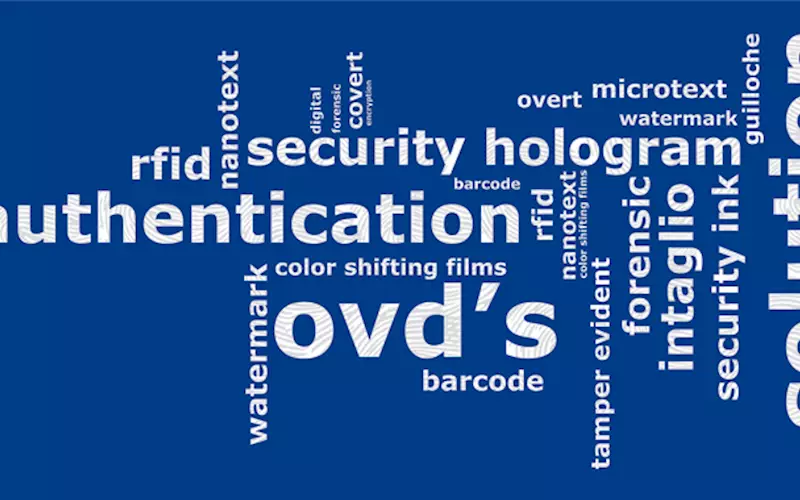Authentication Forum focuses on fighting counterfeits
The need for authentication in the packaging supply chain is no longer a value addition, but a special requirement, especially if it happens to be pharma or cosmetics packaging. The issue is no longer brand protection, but revenue loss, to the tune of Rs 39,239 crore, according to one report.
27 Feb 2017 | By Dibyajyoti Sarma
To address the gravity of the situation, a two-day conference on authentication, the country’s first, The Authentication Forum 2017, was held in New Delhi on 8-9 February. Jointly organised by Authentication Solution Providers’ Association (ASPA) and Messe Frankfurt India, the forum featured a full conference programme targeted at segments including FMCG, auto, pharma, healthcare, electronics, pesticides, alcohol and tobacco, amongst others.
Established in 1998, ASPA is a self-regulated, non-profit organisation of authentication solution providers, with the objective to curb counterfeits. ASPA members protect over 10,000 brands worldwide through the identification of genuine products and documents.
Talks during the forum threw up some interesting numbers.
AK Datta, packaging expert and former head, packaging, Jubilant Life Services, said that of the USD 800 billion global pharmaceutical industry, approximately 10% is believed to be counterfeit.
Sumantra Mukherjee, director, forensics practice, KPMG, said in the FMCG market in India, valued at USD 49 billion in 2016 (which is expected to reach USD 104 billion by 2020), counterfeit products are growing at a staggering rate of 44%, as opposed to 30% a couple of years back. The increase, he said, was due to online business where it is easy for counterfeiters to sell fake products. It is, therefore, important to locate the real source of the product before making a purchase.
Authenticating Make in India
As the country’s industry sectors join forces behind the government vision of Make in India, it becomes paramount for the stakeholders to make sure that authentic Made in India products reach the customers. UK Gupta, president, ASPA, said, “Today, Made in India products have great opportunity. However, with the increase of counterfeiting, there is a constant need to ensure that these Made in India label products are of highest quality, genuine and secured until they are delivered to the end consumer.
He said the ASPA offers various authentication solutions to ensure that Made in India label products are of highest quality and can be easily identified as genuine by brand owners, government authorities and consumers. He said this can be achieved with the help of IT and digital solutions, such as mobile app, SMS and web-based applications.
Nakul Pasricha, vice-president, ASPA, said, “Counterfeiting is increasing 3% per annum globally. In India, the problem is more acute. It is growing with an alarming rate of almost 44% per year. As per the industry body FICCI-Cascade, from the counterfeiting activity the government incurred a loss of Rs 26,190 crore in fiscal year 2011-12. This increased to Rs 39,239 crore in 2013-14, a growth of 49.8% in two years.
Arun Agarwal, general secretary, ASPA, added that the industry can help the government plug these loopholes. “A brand owner that employs an authentication solution is likely to increase his business by cutting down the counterfeiter’s share. “This increased business will consequently bring in more revenue to the exchequer,” he said.
Agarwal said studies have proven that adaptation of authentication solutions can help curb this menace, minimise black money as well as increasing tax revenue. “The most successful case study of this is the use of authentication solutions by various state excise departments to authentic liquor. In India, more than 22 states are using approximately 2,000 crore security hologram (tax stamps) on liquor bottles per annum. The usage of authentication solutions in these States like Tamil Nadu, Uttar Pradesh, Karnataka, Madhya Pradesh, Puducherry, Chhattisgarh, etc has not only minimised the tragedies due to spurious liquor but have also substantially increased the excise revenue collection by more than 15-20% year-on-year,” he said.
After covering the ground realities of counterfeiting and how authentication solutions can help the industry on Day One, the second day of the summit different authentication solutions and trends through a series of sessions on anti-counterfeiting strategies beyond solutions. This offered a 360 degrees integrated approach against counterfeiting; ISO 12931 2012 performance criteria for authentication solutions; successful execution of raids; legal and law enforcement perspectives, insight into new generation OVDs, security labels and strategic consulting, among other key themes.
The forum also hosted a small exhibition of new age digital and physical authentication solutions, such as tamper seal, tamper evident label, security hologram, security label, tax stamps, void tamper films, track and trace solutions, anti-copying solutions, IT-based authentication solutions, holographic shrink sleeves, RFID labels, security papers and fibres, taggants, among others.
Industry-wise loss of sale in 2013-14
Industry FY 2013-14 FY 2011-12
FMCG (packaged) Rs 21,957 cr Rs 20,378 cr
FMCG (personal) Rs 19,243 cr Rs 15,035 cr
Mobile phones Rs 19,066 cr Rs 9,042 cr
Alcoholic beverages Rs 14,140 cr Rs 5,626 cr
Tobacco Rs 13,130 cr Rs 8965 cr
Auto components Rs 1,0501 Rs 9198 cr
Computer hardware Rs 7,344 cr Rs 4,725 cr
Total Rs 1,05,381 cr Rs 72,969 cr
Loss of revenue (Rs in crore)
Industry FY 2013-14 FY 2011-12 Change
FMCG (packaged) Rs 6,096 cr Rs 5,660 cr Rs 436 cr
FMCG (Personal) Rs 5,953 cr Rs 4,646 cr Rs 1,307 cr
Mobile phones Rs 6,704 cr Rs 3,174 cr Rs 3,530 cr
Alcoholic beverages Rs 6,309 cr Rs 2,511 cr Rs 3798 cr
Tobacco Rs 9,139 cr Rs 6,239 cr Rs 2,900 cr
Auto components Rs 3,113 cr Rs 2,726 cr Rs 387 cr
Computer hardware Rs 1,923 cr Rs 1,234 cr Rs 689 cr
Total Rs 39,237 cr Rs 2,6190 Rs 1,3047 cr
(Taxes includes direct and indirect Source FICCI-Cascade Report)













 See All
See All